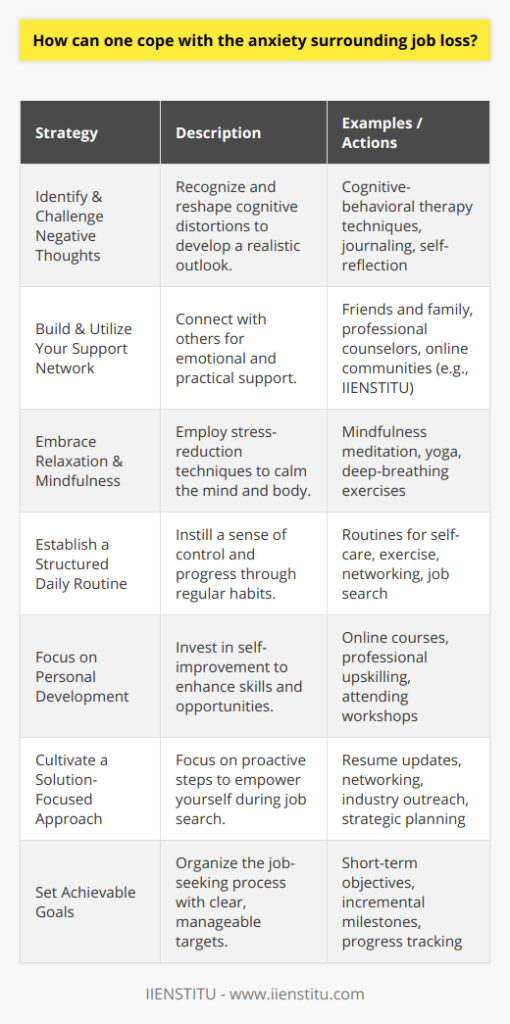The fear of job loss can be a deeply unsettling experience, casting a shadow over your daily life and well-being. It’s natural to feel anxious when you sense your job security might be at risk. This uncertainty can trigger a cascade of negative thoughts and emotions, leaving you feeling overwhelmed and powerless. This article aims to provide practical strategies and coping mechanisms to help you navigate this challenging situation. We’ll explore the psychological impact of job loss anxiety, delve into effective coping techniques, and discuss how to seek support during times of uncertainty.
Job Loss Anxiety
Job loss anxiety is a common phenomenon that stems from the fear of losing your employment. This fear can be triggered by various factors, such as company restructuring, economic downturns, or performance concerns. When you perceive your job security as threatened, your body enters a state of stress response, releasing hormones like cortisol and adrenaline. These hormones can lead to physical symptoms such as increased heart rate, sweating, and difficulty sleeping.
The constant worry about potential job loss can also take a toll on your mental health. You might experience feelings of anxiety, depression, irritability, or even panic attacks. The uncertainty surrounding your future can make it difficult to focus on work, maintain relationships, or enjoy leisure activities. It’s important to recognize that these feelings are valid and that you’re not alone in experiencing them.
Coping with Job Security Fears

While it’s impossible to eliminate the fear of job loss entirely, there are several strategies you can employ to manage your anxiety and cope with these fears. One effective approach is to focus on what you can control. Instead of dwelling on hypothetical scenarios or external factors beyond your influence, concentrate on improving your skills, performance, and professional network.
Engage in activities that promote relaxation and stress reduction, such as exercise, meditation, or spending time in nature. These practices can help calm your mind and body, reducing the intensity of anxiety symptoms. Remember to prioritize self-care by getting enough sleep, eating a healthy diet, and engaging in activities you enjoy. Taking care of your physical and mental well-being will equip you to better handle stressful situations.
Staying Calm During Uncertainty
When faced with job insecurity, it’s crucial to maintain a sense of calm and composure. Avoid making rash decisions or reacting impulsively out of fear. Instead, take a step back, assess the situation objectively, and consider your options carefully. Practice deep breathing exercises to regulate your emotions and reduce feelings of panic. Remind yourself that uncertainty is a natural part of life, and challenges often present opportunities for growth and learning.
Focus on the present moment rather than dwelling on past events or future anxieties. Engage in activities that bring you joy and help you disconnect from work-related stressors. Remember that your worth is not solely defined by your job; cultivate other aspects of your life that provide meaning and fulfillment.
Seeking Support and Guidance

Don’t hesitate to reach out for support during this challenging time. Talk to trusted friends, family members, or mentors who can offer a listening ear and words of encouragement. Consider joining a support group or seeking professional guidance from a therapist or counselor. Sharing your concerns with others can help alleviate feelings of isolation and provide valuable perspectives.
If you’re experiencing severe anxiety or depression, don’t hesitate to seek professional help. A mental health professional can provide personalized coping strategies and support to help you navigate this difficult period. Remember that seeking help is a sign of strength, not weakness.
Exploring Your Options
While it’s important to focus on managing your anxiety, it’s also wise to explore your options if you believe your job security is genuinely at risk. Update your resume and online profiles, network with professionals in your field, and start exploring potential job opportunities.
Consider developing new skills or certifications that could enhance your marketability. Remember, even if you ultimately retain your current position, taking proactive steps can empower you and provide a sense of control during uncertain times.
Conclusion
Job loss anxiety is a common and understandable fear. By implementing the coping strategies outlined in this article, you can manage your anxiety, stay calm during uncertainty, and explore your options effectively. Remember to prioritize self-care, seek support from trusted individuals, and focus on what you can control. While job security can be a source of stress, it’s important to remember that you are not defined by your employment status. Cultivate resilience, embrace opportunities for growth, and navigate this challenging period with strength and determination.



